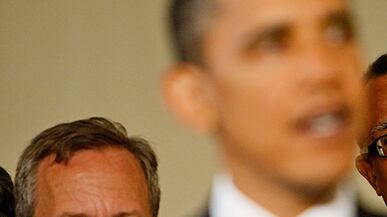The rumor that come November, when the mid-term elections are history, Lawrence Summers, administration's quarterback on economic matters, will leave the White House, has been confirmed. The usual presumptions have been put in play: Summers is weary of the job; the president and his men and women feel the need for a new pair of hands under center; the man has done well; the man has done badly. There is no indication that, like Bush II's ill-served first Treasury Secretary, Paul O’Neill, Summers is being canned for speaking truth to power. That is not the man's style, not—let it be said—that there's much evidence that the administration has better than a shaky grasp of the practical truths of American financial and economic life in the Age of Goldman Sachs.

The bottom line is that we can expect the usual judgemental blahblahblah to grow in volume and marginality on the talk-show and Op-Ed circuit as the day calendared by the media for Summers' leave-taking approaches.
Summers saw to it that the talk was talked, but the walk was never walked.
I have no punditical stake in the outcome. I am no admirer of Summers. I don't know the man; I am not an angry alumnus of Harvard rending my crimson garments and keening over the financial and ideological travesties associated with his tenure as President of my alma mater. I have heard him speak once or twice; in both instances I thought myself to be listening to the smartest man in room, certainly in the speaker's opinion. Henry Ford famously observed that history is bunk, which is my view of economics (and economists) generally. Summers is right at the top of the list of America's best-known economists, and therefore, in my eyes at least, is guilty by association.
• Who’ll Replace Summers? Spitzer, Jesse Jackson, Desiree Rogers, and More React Oddly enough, none of this bears on my view as to the reasons for Summers' departure. I think he is leaving because he has done what he came to do. I think he was hired to do a job, has done it with all the admirable consistency, duplicity and proficiency that such a job requires, and now both he and his employer agree that all would best be served by Summers' moving on to do the same thing elsewhere. It's a classic American theme: In a troubled town, a gunfighter of reputation is hired by the mayor and his circle to deal with the problem. He does so, hands in his star and rides on, leaving his bailiwick in the condition his patrons wanted. In this instance, the problem dealt with was a bunch of noisy would-be reformers wanting to clean up the place. Think of Summers in the Jack Palance role in "Shane." The question is: will Alan Ladd ever show up?
I think Larry Summers was tasked with making sure the kind of backlash that in 1933 unleashed Ferdinand Pecora on Wall Street didn't happen in 2009. I think Larry Summers was tasked with marginalizing Paul Volcker, who could thus serve the new administration as moral window-dressing without actually causing trouble. I think it was understood from the outset that any meaningful economics program must involve taking Wall Street to the woodshed, and that this must not be allowed to happen. I think Larry Summers, skilled in the ways of the Washington equivalent of Dickens's "Circumlocution Office" (in Little Dorrit), saw to it that it did not.
One of the most famous of modern quotations comes from Lampedusa's The Leopard, when the old prince's fiery nephew Tancredi tells his uncle, "In order for things to stay the same, everything must change." But change is as change does. In our time, where talk is deemed equivalent to action, Tancredi might have said, especially had he been a high-ranking Wall Street executive, "In order for things to remain the same, it is only necessary to talk about change."
As in "I am the Candidate of...."
I think Summers, with a deftness that would be admirable were it not so repellent in its long-term effects, in what it has cost this nation, saw that change was talked about, but not initiated. The talk was talked, but the walk was never walked.
That's what Summers came to do, in my opinion, and that's what he did. If, in November, he actually leaves the White House, he can with pride and justice flaunt a banner that reads " Mission Accomplished." On few mortals is such greatness showered.
Thomas is a frequent commentator on Wall Street and the author of eight novels set in the world of high finance, with a ninth—about the financial crisis and bailout—in progress.






